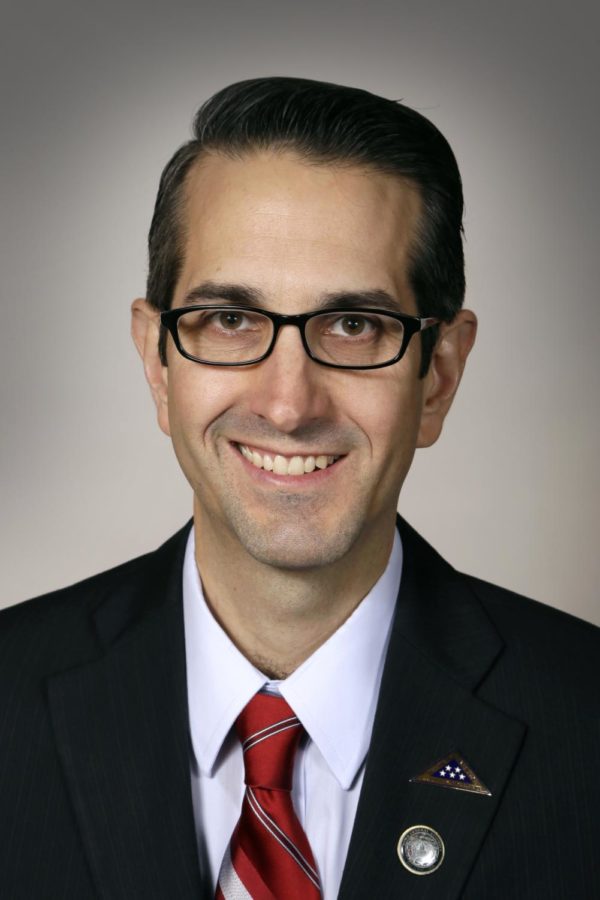Controversial bills could affect ISU students if signed into law
Rep. Joel Fry on Wednesday, Feb. 11, 2015, at the Statehouse in Des Moines, Iowa.
March 22, 2015
Ultrasounds before abortion, minimum wage and marijuana are the subjects of several pieces of legislation making their way through the statehouse, and could impact students in Ames and across the state.
The bills have all passed at least one side of the divided legislature and while they may face opposition in the opposite chamber, if bills were to become law, they would greatly impact students in Iowa.
One bill, House File 573, passed the Republican-controlled House would require women seeking an abortion to have an ultrasound before the abortion procedure.
“Republicans should stop playing doctor,” said state Rep. Beth Wessel-Kroeschell, D-Ames. “Since medical science changes, the legislature has never put medical standards of practice in the Iowa Code for any medical procedure. Democrats trust women to make their own health care decisions.”
The bill would require doctors who perform a patient’s abortion to perform the ultrasound, show women an image that shows the age and image of the fetus and also give women a chance to hear the heartbeat. Doctors would still have to perform the ultrasound, though the women do not have to see the results. Doctors who fail to follow requirements could face a fine.
“It is my belief that we are defending two lives here, a mother and a child,” said state Rep. Joel Fry, R-Osceola. “[The discussion] needs to focus on not just one individual, but two. It’s my attempt to bring to the forefront the voice of one that is often not heard.”
The bill passed, mostly on a party line vote, 57-39.
“It’s a very gross intrusion into the privacy of women seeking medical care,” said state Sen. Herman Quirmbach, D-Ames. “It will go nowhere in the Senate.”
Two other bills have passed the Democratic-controlled Senate, but their futures seem glim in the GOP House.
An increase to the state’s minimum wage passed the Senate, this one also on a mostly party line vote, 27-22.
The bill would increase the minimum employers could pay workers to $8 per hour later this year, then again to $8.75 per hour by next summer.
“I remember my first job out of high school, I worked minimum wage for $1.60 an hour. That sounds pretty pitiful, but adjusted for inflation, that’s the highest the minimum wage has ever been,” Quirmbach said. “We’ve spent the last 47 years paying our workers less than what I got. People at the bottom of the ladder deserve a raise.”
Republican opponents say the bill would cause job losses and an increase to prices so businesses could offset the costs.
Another bill passed by the Senate would reclassify the punishment if a person is arrested for possession of marijuana.
“The old phrase is ‘make the punishment fit the crime,’ and I think there was a general feeling that for first time possession, the penalties were more serious than the nature of the offense,” Quirmbach said.
The bill had more bipartisan support than the others, passing 36-13.
If signed into law, possession of 5 grams or less of marijuana would now be a simple misdemeanor and punishable of a fine up to $625 and 30 days in jail. Currently, possession of 5 grams is a serious misdemeanor punishable by six months in jail and a $1,000 fine.
“Possession of marijuana is still illegal, you can still get busted for it and that’s a situation they don’t want to be in,” Quirmbach added.
Jimmy Centers, Gov. Terry Branstad’s spokesperson, declined to say if Branstad would sign any of the three bills have they made it to his desk.
“The governor would carefully review the bills should they pass both chambers and arrive on his desk,” Centers said.
Democrats and Republicans are also at an impasse when it comes to education funding.
Republicans have offered a 1.25 percent increase, while Democrats insist on a 4 percent increase. Discussions have taken place in committees in both houses to come to an agreement on funding, but so far, no compromises have been reached.
“We were at 6 percent last year in the Senate. The House failed to pass a bill and broke the law. They’re suppose to do this a year ago,” Quirmbach said. “They came in this year at [1.25 percent], and in a show of good faith, we came down from 6 to 4. We are trying to show a willingness to negotiate, but so far they have not shown a willingness to negotiate.”
Branstad’s spokesperson said that the governor’s budget he laid out during his Condition of the State address in January adequately funds education in Iowa.
“The governor recommended a biennial budget on the second day of the session that included more than $3 billion of funding for K-12 education,” Centers said. “The governor believes his proposal, which provides funding for two years, gives school districts the predictability and stability needed to plan for the upcoming school years.”
Although the two sides seem far from a deal, Quirmbach said he remains optimistic on funding for universities.
“I am still hopeful that we will get the funding for the universities to enable a third tuition freeze.”
The Iowa Legislature is scheduled to be in session until at least May.







